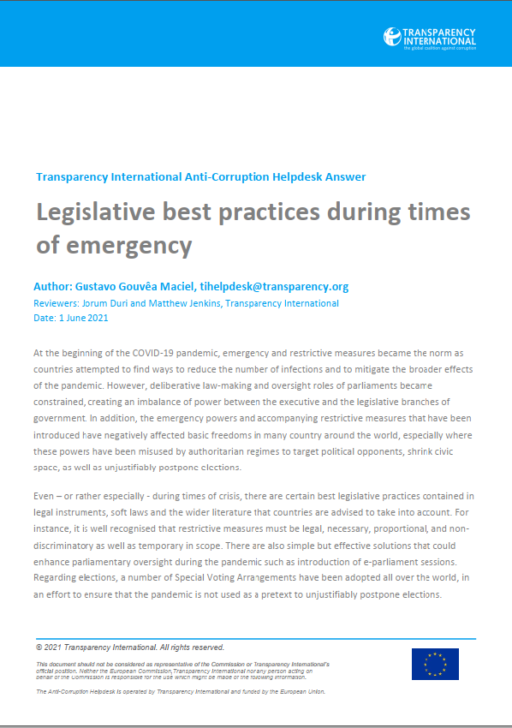
This Anti-Corruption Helpdesk brief was produced in response to a query from one of Transparency International’s national chapters. The Anti-Corruption Helpdesk is operated by Transparency International and funded by the European Union.
Query
Please provide an overview of best legislative practices during times of emergencies. In the answer, please include an overview of the impact of emergency restrictions on democratic and legislative processes, civic space, and anti-corruption in general.
Summary
At the beginning of the COVID-19 pandemic, emergency and restrictive measures became the norm as countries attempted to find ways to reduce the number of infections and to mitigate the broader effects of the pandemic. However, deliberative law-making and oversight roles of parliaments became constrained, creating an imbalance of power between the executive and the legislative branches of government. In addition, the emergency powers and accompanying restrictive measures that have been introduced have negatively affected basic freedoms in many country around the world, especially where these powers have been misused by authoritarian regimes to target political opponents, shrink civic space, as well as unjustifiably postpone elections.
Even – or rather especially - during times of crisis, there are certain best legislative practices contained in legal instruments, soft laws and the wider literature that countries are advised to take into account. For instance, it is well recognised that restrictive measures must be legal, necessary, proportional, and non-discriminatory as well as temporary in scope. There are also simple but effective solutions that could enhance parliamentary oversight during the pandemic such as introduction of e-parliament sessions. Regarding elections, a number of Special Voting Arrangements have been adopted all over the world, in an effort to ensure that the pandemic is not used as a pretext to unjustifiably postpone elections.
Contents
1. Background
2. The broader impact of emergency restrictions on democratic and legislative processes, civic space, and anti-corruption
3. Best practices for legislatures during times of emergency
4. Conclusion
5. References
Main points
- International instruments regulating measures that restrict human rights in times of crisis include Article 4 of the International Covenant on Civil and Political Rights as well as the accompanying Siracusa Principles on the Limitation and Derogation Provisions.
- When enacting measures that restrict rights, it is important to ensure they meet the requirements of legality, necessity, proportionality, and non-discrimination.
- Emergence measures must be strictly temporary in scope, the least intrusive to achieve emergency goals, and be subject to review.
- There are simple but effective solutions that can enhance parliamentary functions during COVID such as the use of e-parliament programmes or social media and online platforms to interact with citizens.
- Since beginning of the pandemic, countries around the world have increasingly adopted Special Voting Arrangements (SVA) to prevent postponement of elections.
Authors
Gustavo Gouvêa Maciel, [email protected]
Reviewers
Jorum Duri and Matthew Jenkins, Transparency International
Date
04/06/2021

